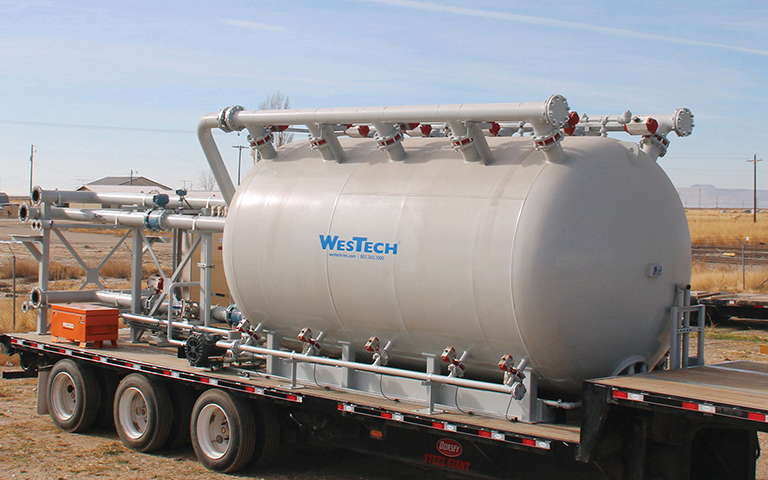Temporary System Best Solution for Power Plant
RapiSand™ and Horizontal Pressure Filter Dewater Ash Pond

Overview
When a retired power plant in the Southeast U.S. initiated a project to decommission its site, the plant selected a fully operated mobile and temporary systems solution from WesTech rather than purchasing (and providing operations staff for) permanent capital equipment. The three-year contract the plant negotiated with us included a single treatment train with a design flow capacity of 750 gpm (170 m3/h) and a qualified technician to operate and maintain the equipment.
The treatment train currently includes a mobile RapiSand™ ballasted flocculation system, which reduces total suspended solids (TSS), mercury, and arsenic from the on-site coal ash pond. A mobile horizontal pressure filter then further reduces TSS and arsenic in the treated water, enabling the plant to discharge the system’s effluent directly into a nearby river. Solids are sent back to the coal ash basin to reduce sludge handling.
After more than three years of use, the temporary system is as clean and runs as efficiently as it did when it was installed. This speaks directly to the quality and reliability of our system. We have received numerous requests to operate the system 12-hour shifts, seven days a week and have met each request.
In addition to on-site operations, we provide a technical advisor and technical support for the plant from our main office. The solution also includes our mobile ChemCenter, which provides a weather controlled, plumbed, and wired chemical dosing enclosure with a programmable logic controller (PLC). The ChemCenter supplies power and automates chemical addition and data logging for each stage of the treatment process. Like all of our mobile water treatment solutions, this small system provides the flexibility to scale up or down to meet changing conditions.
Highlights
- The RapiSand uses internally circulated sand ballast and tube settlers to clarify influent at a design flow rate up to 750 gpm (170 m3/h) in a tank that measures just 25.5 ft x 8 ft x 10 ft (7.8 m x 2.4 m x 3 m). Actual flow rates depend on inlet TSS and arsenic levels and average between 650-700 gpm (148-159 m3/h) for sustained 8-10 hour run times.
- Influent arsenic levels average from 50 to 100 parts per billion (ppb). RapiSand regularly reduces these levels to non-detect, with a highest recorded level of 5 ppb. The plant’s effluent quality requirement is <45 ppb.
- Effluent total suspended solids (TSS) average between 1-5 mg/L and never exceed 7 mg/L. The plant’s effluent quality requirement is <27 mg/L.
- The system has survived a category 5 hurricane (2019) and punishing summer temperatures with rolling thunderstorms, all with little or no damage.
- The system has had zero maintenance issues after three years in operation.
Measurable
Results
>99%
Reliability
1-5 mg/L
Average Effluent TSS
130 Million Gallons
Clean Water Produced in 3 Years